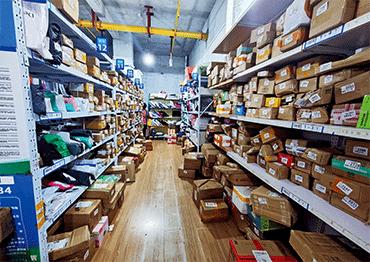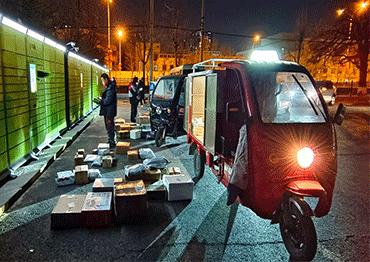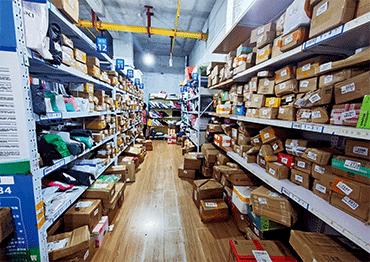As couriers quit and delays mount in the wake of new regulations on China’s express delivery industry, insiders anticipate the shake-up will reshape the sector
Express delivery companies are now required to inform recipients before leaving packages in drop-off lockers or pick-up points, or face fines of up to 30,000 yuan (US$4,150).
This is just one of 57 new rules introduced by the Chinese Ministry of Transport to regulate the country’s express delivery industry, covering customer rights, price controls and promoting eco-friendly practices.
However, just days after the rules went into effect on March 1, delays mounted as the industry struggled to adjust.
Industry experts told NewsChina that customers misunderstood the drop-off rule. Expecting couriers to deliver parcels directly to their doorsteps, many filed complaints with courier companies.
In response, companies imposed fines on their couriers. This sparked a wave of resignations, and delivery delays began mounting.
Wang Tian, a customer in Wuhan, Hubei Province, shared her experience of tracking her package being returned to a regional warehouse instead of her home.
“I learned that many other online consumers encountered similar situations, or went to their local community delivery hub only to find mountains of unreceived parcels,” Wang Tian told NewsChina. When she called the courier company, ZTO Express, she was told that her local delivery hub had been shut down due to lack of couriers.
“We had about 20 couriers when we opened, but we only have seven now,” a manager at a Wuhan Mall delivery hub for ZTO Express told the reporter. A company spokesperson told NewsChina that the hub was functioning normally, but admitted that the growing influx of parcels may slow delivery times.
Similar delays occurred in other cities. “I noticed parcels were being delivered around 11 pm, which is unprecedented,” said Beijing resident Zhu Tao. Social media lit up with claims that 30-minute deliveries now take 12 hours, and that couriers had resigned within two days of the new rule going into effect.
Ding Hongtao, legal affairs department director at the China Express Association, told Xinhua News Agency that the new rules do not mandate doorstep delivery, but rather emphasize the importance of prior notification and consent from consumers.

:A delivery hub is packed with parcels, Enshi, Hubei Province, February 21, 2024 (Photo by VCG)

Couriers sort parcels in front of drop-off lockers in a community at night, Fengtai District, Beijing, January 9, 2023 (Photo by VCG)
Part and Parcel
“A few days ago, a customer asked me to provide doorstep delivery, and I was surprised since his parcel weighed about 20 kilograms,” Gao Yang, 37, 14-year veteran courier in Wuhan’s Hanyang District, told NewsChina. “In the end, the online vendor kicked me two yuan (US$0.27) extra, and I had to carry the parcel all the way up to the fifth floor,” Gao said, adding the delivery left him with severe back pain.
Gao noted a growing trend where more customers are citing the new rule to demand doorstep delivery. “I’m quite down about it. Even before the new regulations, we made efforts to satisfy their demands,” Gao told the reporter, adding he only receives 0.8 yuan (US$0.11) for each delivery.
Many couriers are now grappling with a substantial increase in their workload. Previously, Gao Yang used to wake up at 5 am to head to the delivery center and work until late evening for 6,000 yuan (US$830) per month. However, with the rise in doorstep deliveries, the usual workload has become overwhelming. According to Gao, the number of completed deliveries per day has dropped significantly from over 300 down to around 100.
Zhou Fan, who manages a courier service hub in Wuhan, crunched some numbers to illustrate why some couriers are balking at the new rule. He told NewsChina it takes at least three minutes for a courier to get in touch with a consumer by phone. This equates to 20 calls an hour, which decreases the total number of deliveries. “Looking at the industry as a whole, couriers typically handle more than 300 deliveries per day. If every parcel has to be delivered to a doorstep, the actual number of deliveries completed could drop to just over 100,” Zhou added.
“It is unrealistic to call ahead to confirm delivery details with each customer since there isn’t enough time,” Zhou said. “What’s worse, some do not answer calls, call back at inconvenient times, or hang up abruptly, so you cannot complete the delivery at all,” he said.
Couriers are facing increased fines. According to a 2021 survey by Express Delivery 100 Logistic Information Platform, approximately 60 percent of couriers had been fined over 200 yuan (US$28) per month, 27 percent of couriers had been fined 200-500 (US$28- 70), 26 percent between 500-2,000 yuan (US$70-277), and 4 percent of couriers had been fined over 2,000 yuan (US$277) per month.
Senior industry insiders revealed to NewsChina that fines against couriers make up over half of the net profit for many express delivery companies.
“I got six complaints from customers over the first two weeks of March, much more than the two to three complaints in the months prior,” said Liu Tong, a courier based in a first-tier city.
With more customers requesting doorstep delivery, Liu Tong works 5 am through 9 pm, starting his shift an hour earlier and ending an hour later than usual. The majority of the added time is spent calling customers.
Unfortunately, some customers’ calls go unanswered, leading to complaints against him. In other cases, parcels are signed for by a family member without the customer’s knowledge, leading to more complaints.
Some couriers told NewsChina that the new rules have not impacted their jobs. Zhou Fan said that some 70 to 80 percent of parcels are delivered to lockers or hubs with consent from customers. In most cases, office workers do not require delivery to their desks.
Zhou pointed out that while the new regulations aim to protect the rights and interests of the elderly, ill and disabled in need of doorstep delivery services, they may increase customer demand in the short term.
“Delivery hubs and couriers are the foundation of the industry. Courier companies must maintain the stability and functioning of terminals and ensure couriers’ legal rights, which is the industry consensus,” Ding Hongtao said, adding that express delivery companies have begun to adjust their performance appraisal systems for couriers.
An industry insider pointed out that three factors will determine the new rules effect on the industry: effective regulatory penalties, express delivery companies’ actions such as employing more personnel and adjusting measures, and support from e-commerce.
Market Reshuffle
As profit margins shrink, many express delivery hubs are fighting to stay afloat.
Song Ke, who invested 1 million yuan (around US$138,000) in a delivery service center in Chengdu, Sichuan Province, claims it is hemorrhaging funds on temporary hires to handle the increase in doorstep deliveries and penalties for increasing customer complaints. Song said he is unsure how to remedy the situation. “We have not yet received any government guidance and don’t know the way forward,” Song said.
Others are better navigating the initial challenges the new regulations pose. Ding Hongtao said that within weeks since they took effect, some express delivery companies implemented AI voice calling systems to boost efficiency and enhance customer experience.
Zhang Feng, who operates an express delivery facility in Wuhan, told NewsChina that a few of his couriers resigned, but he promptly replaced them.
“Even if demand for doorstep delivery increases, effective services and management have allowed for relatively controlled business development so far,” Zhang said. As couriers at his center are familiar with local customers, they make sure to communicate clearly and tailor services to their needs, he added.
In 2023, China’s express delivery services handled 132 billion parcels, which generated 1.2 trillion yuan (US$170b) in revenue, a 19.4 percent and 14.3 percent increase compared with 2022. Annual per capita volume of express deliveries has already exceeded 90 parcels.
An industry insider told NewsChina that local delivery facilities must adjust their strategies to cope with the stricter requirements mandated by the new regulations, such as increasing delivery personnel, providing more diverse options to customers and ensuring timely communication with customers who have urgent requests.
Multiple interviewees in the industry said the new regulations are expected to accelerate a market reshuffle. Companies that fail to communicate with customers and provide doorstep delivery services are likely to encounter more challenges ahead.
Not Another Price War
Since the first private Chinese courier company STO Express opened in 1993, the country’s private express delivery sector boomed, propelling China to become the global leader in terms of express delivery volume.
But over the past two decades, spurred by the e-commerce industry, the express delivery sector has been embroiled in a continuous price war. In 2006, YTO Express took the lead in collaborating with e-commerce companies to gradually reduce prices from 20 yuan (US$2.76) to 12 yuan (US$1.67) per parcel. In 2012, ZTO Express cut rates even more to 10 yuan (US$1.4) for three parcels, enabling the company to capture a larger market share.
By 2018, the rise of new e-commerce platforms like group shopping app Pinduoduo sparked new rounds of rate slashing. Several express delivery managers told NewsChina that the ongoing price war led to sustained financial losses for local courier hubs.
“The discounted rates for e-commerce parcels aim at capturing market share, and despite losing about 0.1 to 0.2 yuan per parcel, we cannot afford to refuse orders. Otherwise, we’ll face even more fines from the company,” Zhang Feng said.
Official data reveals the industry’s intense price competition in recent years. From 2007 to 2022, China’s express delivery industry saw a substantial surge in volume, soaring from 1.2 billion to 110.6 billion parcels – a 35 percent annual increase over 15 years. However, over the same period, revenue per individual parcel plunged from 28.5 yuan (US$4) in 2007 to 9.6 yuan (US$1.33) in 2022, marking a 67 percent decrease.
Zhou Fan told NewsChina that many express delivery firms had initially planned to further lower delivery fees this year. However, the new regulations have increased costs, making any additional price cuts currently unfeasible.
Logistics expert Zhao Xiaomin criticized the industry’s relatively inconsistent service quality and inadequate R&D investment record. The new regulations could serve as a turning point to address these issues.
“The market is poised for restructuring to redistribute profits, including reforms to the free shipping policies for e-commerce goods and incentives for local delivery facilities, among others,” Zhao said.
Moving forward, express delivery companies should enhance their services, prioritize the rights and interests of their couriers and explore more opportunities in rural areas, local factories and overseas markets, an interviewed source told NewsChina.
“Only then will a truly competitive landscape will emerge for the express delivery industry,” the source said.
Zhao mentioned that additional policies aimed at safeguarding the interests of couriers and consumers are expected to be rolled out later this year.
They include time outlines for domestic express delivery, specific employee rights and protections, data security in the collection, storage and use of personal information, and setting reasonable service fees.
“If the price war continues, everyone loses. Express delivery companies have reaped significant benefits from decades of growth. They cannot solely rely on low prices and shift the burden onto couriers,” Zhao said.

 Old Version
Old Version

